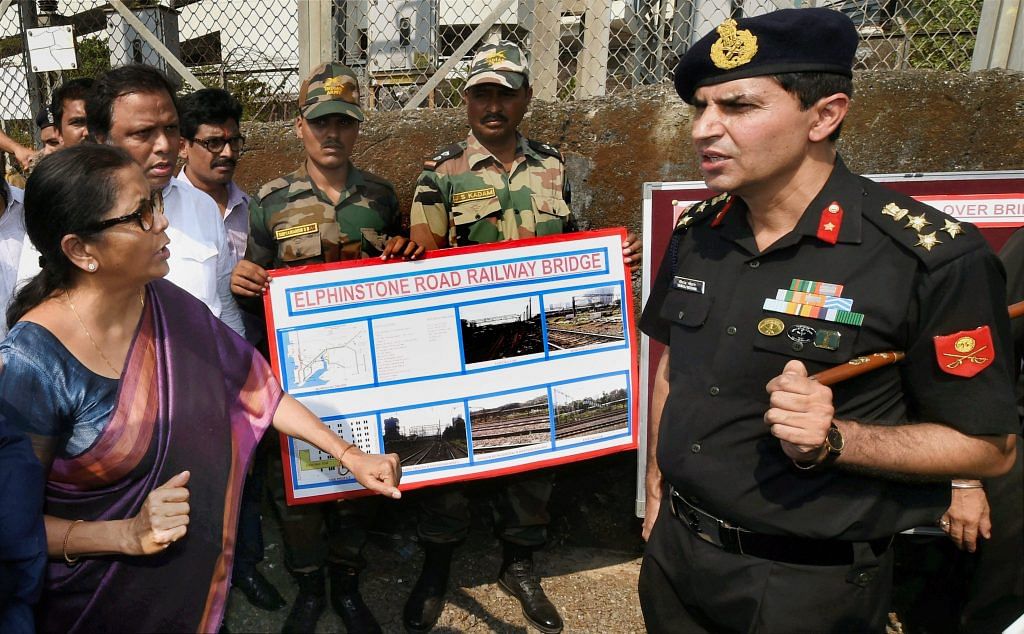This bridge building task is being assigned to the Army in a city that has the richest municipal corporation, i.e. Mumbai’s BMC.
The Indian Railways is one of the country’s largest organisations, and till recently, even had the privilege of a separate budget, and a specific day for it in the nation’s annual calendar.
But the political mismanagement of what is otherwise grandiosely called the nation’s ‘life line’ has been obvious for several decades now. Frequent accidents and a seeming lack of regard for passenger safety and lives has long come to define the Indian Railways, despite having many dedicated and committed people in its workforce.
It is also not surprising that the consequences of decades of apathy are increasingly manifesting in not just train accidents, but also in tragedies like the Elphinstone Road bridge collapse that claimed lives of many.
Because it is mostly the poor and lower middle class that travel by train, the need to fix the crumbling infrastructure and safety record should obviously be a priority.
It is in this context that we saw an image of two cabinet ministers (defence and railways), along with the Maharashtra Chief Minister, assemble a few days ago in Mumbai to announce that the Army will now be deployed to build three new foot over-bridges for the Railways.
On the face of it, there should be no problem with this. The armed forces are probably one of the last remaining professional, competent organisations in the country (apart from ISRO). Despite their primary mission being combat, in peacetime, armed forces can and must step in for helping in civil emergencies. They do this repeatedly with great passion and dedication, be it natural or man-made calamities like floods, earthquakes, or riots etc. So why the furore about the Army building bridges in Mumbai?
Let’s understand this one basic fact: It is not advisable to take a combat trained organisation and deploy it in civil situations too often. Armed forces deployment in civil situations takes place because of one of two reasons – it is an emergency and its resources supplement civil government resources or when the civil administration is overwhelmed or breaks down.
This bridge building task is being assigned to the Army in a city that has the richest municipal corporation, i.e. Mumbai’s BMC. Its state government has enormous resources, as does its public works department. The Railways has 1.3 million employees, and a dedicated projects and construction capability. There is no conceivable logic to involve Army in what any of these three organisations should be able to do.
So while the railway minister is known for his enthusiastic and energetic dive-in approach into all problems, I think he should have been more careful in advising against deploying the Army in what is clearly the responsibility of the railways, the PWD, or the BMC.
The use of the Army shines a glaring spotlight on the perceived incapability of these three agencies. Accountability must be fixed if these organisations are not delivering the basic safety in public infrastructure, especially in basic works such as foot over-bridges.
As the smoke clears, it is clear that in a sense, there was an emergency in Mumbai, caused by the Elphinstone Road bridge. Given the railways’ bureaucratic approach to contracting, a rapid solution would not be forthcoming from the railways, the PWD, or the BMC.
And so, in the absence of any other capability in the government, the Army was brought in for its ability to rapidly deploy and execute projects. The Army has been and will always be the last and most dependable port of call for the people of India, and in this case the people of Mumbai – lending credence to that slogan, “When all else fails, call the armed forces”.
Predictably, many serving and retired armed forces officers are not happy with this decision at a time when perceived tensions between the bureaucracy and military are increasing. The armed forces have always been characterised by a stoic disciplined acceptance of their lot. They have remained silent in the face of the political dithering of ‘One Rank One Pension’ for over four decades, till this government addressed it to a large extent.
The new defence minister must ensure that the Army’s deployment in these kinds of projects passes the litmus test of civil administration failure, rather than some political expediency. The railway minister must channel his enthusiasm and energies into rebuilding the capabilities of efficient project management and execution within the railways, and to transform the railways into a motivated, global standard organisation that can build its future bridges and care for its passengers on its own.
The author is NDA Member of Parliament
